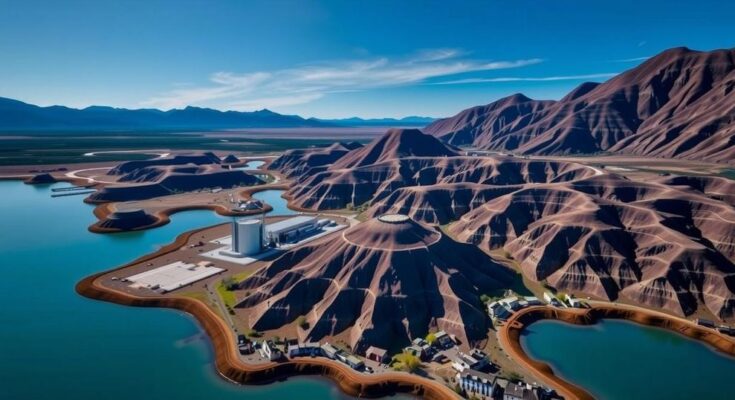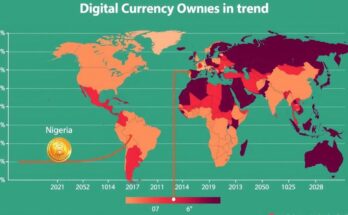Bolivia has signed a $1 billion agreement with China’s CBC for lithium carbonate plants in Uyuni, aiming to increase production to 35,000 tonnes a year. The deal, while motivating, faces political and logistical challenges, with the need for legislative approval looming as elections approach in 2025. Bolivia’s history of struggling with resource exploitation and dependency on foreign investments raises concerns about its long-term economic autonomy.
Bolivia has entered into a substantial agreement worth $1 billion with China’s CBC, a subsidiary of the prominent battery manufacturer CATL, to develop two lithium carbonate production facilities in the Uyuni salt flats. Announced on November 26, the initiative aims to enhance Bolivia’s standing in the international lithium market after years of challenges in harnessing its vast lithium reserves. The facilities aim to produce 35,000 metric tonnes of lithium each year using innovative direct lithium extraction (DLE) technology, ensuring a quicker and more eco-friendly production process.
The Bolivian government, through its state-owned enterprise YLB, will retain a 51% ownership stake in this project, thereby maintaining national control over these valuable resources. President Luis Arce heralded this agreement as a significant step towards establishing Bolivia as a leading player in the global lithium sector, emphasizing its capacity to influence international lithium prices. Nevertheless, the ambition is clouded by potential political and logistical challenges, including the need for parliamentary approval, which could stall progress in Bolivia’s fragmented legislature as elections close in for 2025.
This latest development follows an earlier $976 million agreement made with Russia’s Uranium One Group, which also utilizes DLE technology and aims to yield 14,000 tonnes of lithium annually. The Bolivian government selected Uranium One, alongside CBC and Citic Guoan Group, for the establishment of pilot DLE plants last year, with hopes of transitioning to large-scale industrial operations subsequently. The Bolivian government has set a target of exporting 50,000 tonnes of lithium carbonate equivalent every year.
However, Bolivia’s reliance on investments from China and Russia could jeopardize its long-term economic and geopolitical stability. Although these partnerships facilitate immediate capital influx and access to cutting-edge technology, they may constrain Bolivia’s autonomy over its resources and bind it to the strategic desires of these foreign powers. Such dependence risks resulting in unfavorable conditions, including diminished local advantages and restricted technology transfers, ultimately undermining Bolivia’s sovereignty within the lithium sector.
With the largest estimated lithium reserves globally, totaling approximately 23 million tonnes, Bolivia stands at a promising but underutilized frontier. The country has consistently lagged behind its regional counterparts, Chile and Argentina, in lithium production, encountering significant hurdles such as infrastructure deficiencies, regulatory challenges, and political instability, which have historically dampened investor confidence.
Since the 1990s, Bolivia’s efforts to develop its lithium or other industries have been marred by bureaucratic inefficiencies and complicated logistics. Moving forward, companies engaging in this sector must traverse through complex environmental regulations and obtain requisite legislative approvals, a challenging prospect given the current political fragmentation and the approaching national elections in 2025.
Bolivia’s lithium reserves, the largest in the world, have created anticipation among investors regarding the country’s potential in the global market for lithium, a crucial component in battery production. Despite these rich reserves, Bolivia has historically struggled to capitalize on its natural resources due to bureaucratic challenges and political instability. Previous attempts, and agreements with foreign firms, have met with mixed success, further complicating the landscape for future contracts and developments in the sector. Political dynamics, particularly the fragmented nature of the legislature, remain critical in determining the success of endeavors in lithium extraction and exportation.
The recent $1 billion deal between Bolivia and China’s CBC marks a pivotal moment in the country’s strategy to enhance its foothold in the global lithium market. While the construction of lithium carbonate plants holds promise for increased production and economic growth, Bolivia faces substantial political and logistical hurdles that could impede progress. Moreover, the nation must navigate the complexities of its reliance on foreign investments from China and Russia, ensuring it retains sovereignty over its natural resources while meeting its ambitious targets. Moving forward, the equilibrium between foreign partnerships and national control will be paramount to Bolivia’s success in the lithium market.
Original Source: www.intellinews.com



